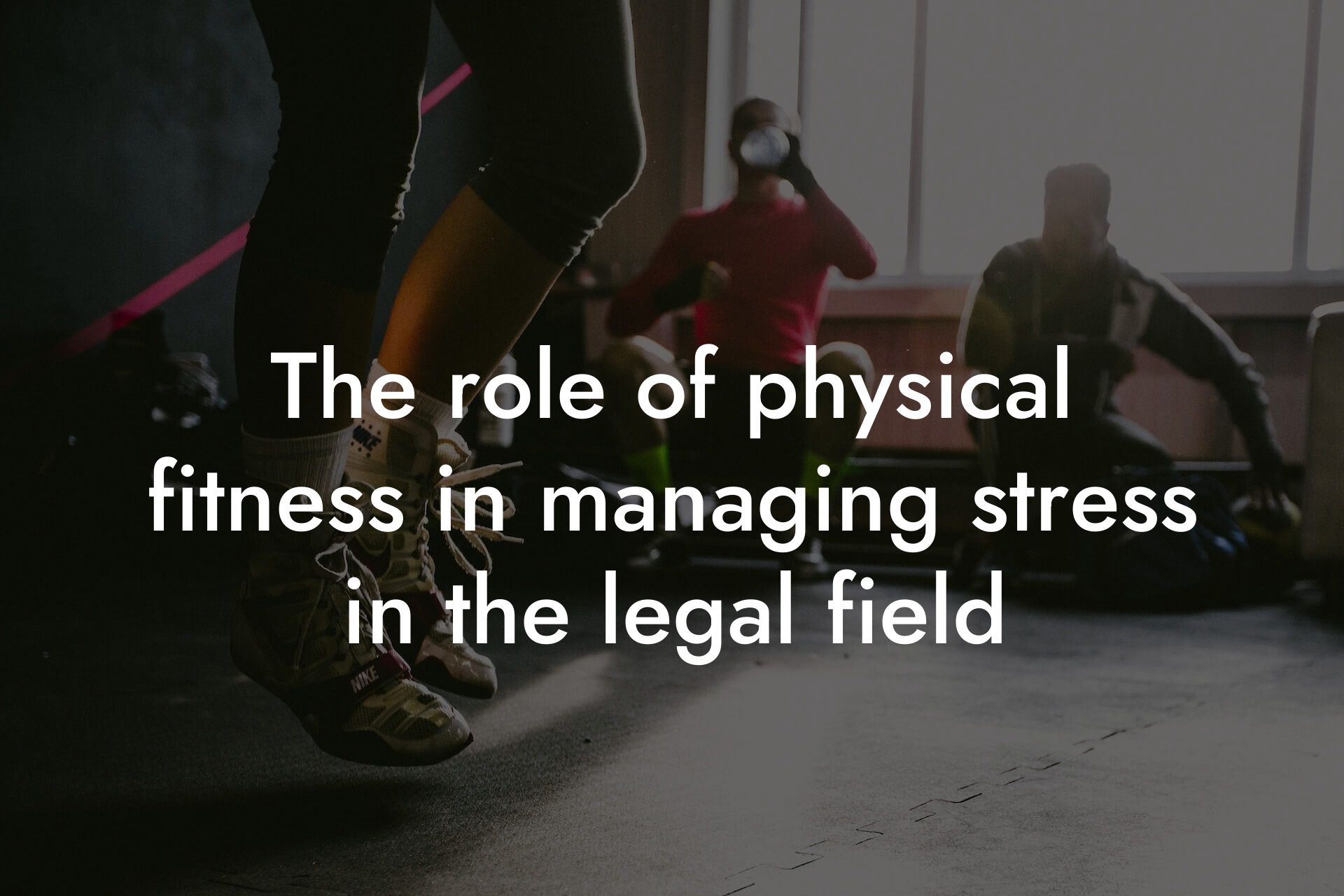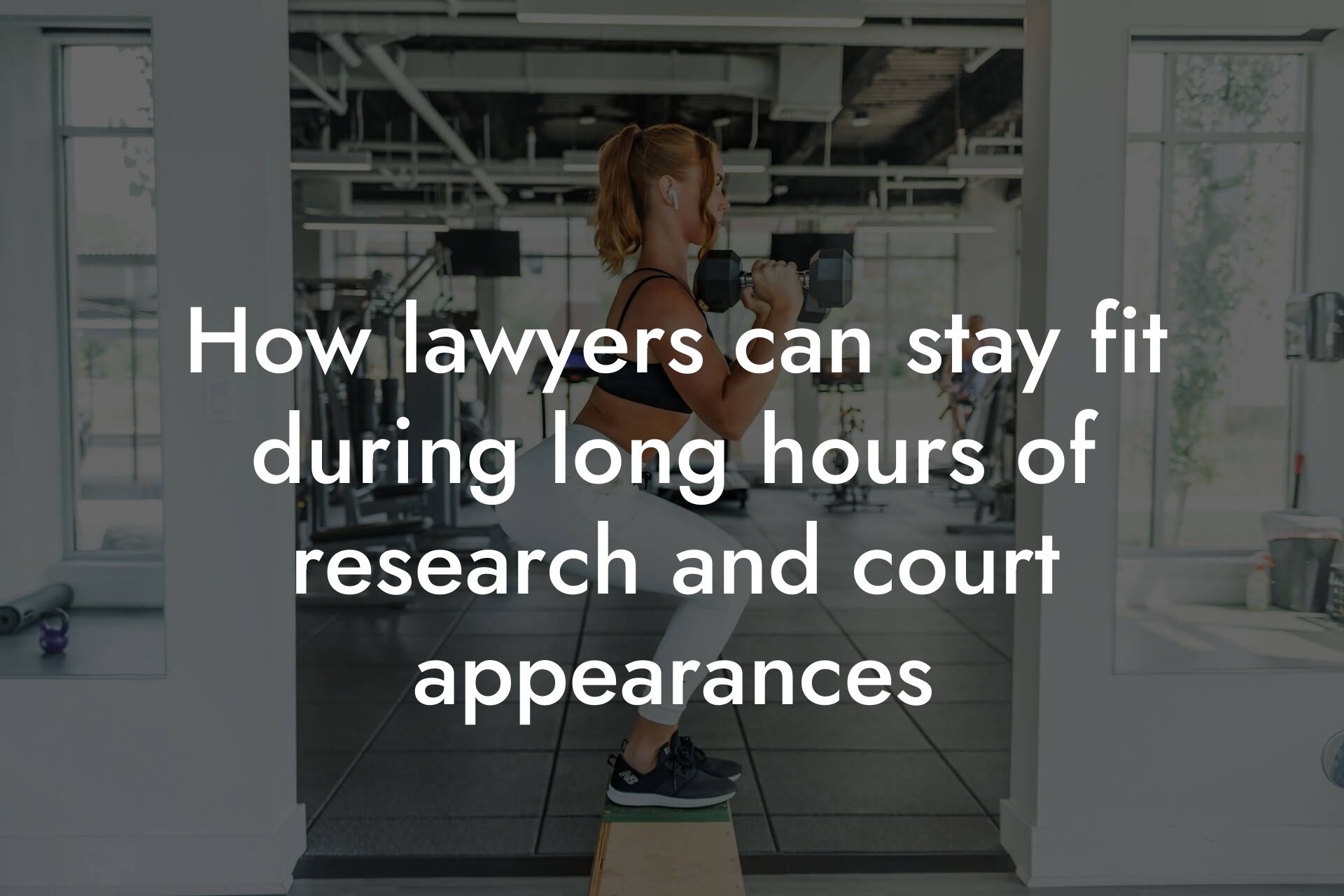As a high-earning professional, you understand the importance of maintaining a healthy and active lifestyle. However, with demanding schedules and long hours spent in courtrooms, depositions can be a significant obstacle to staying physically active. Prolonged periods of sitting can lead to a range of negative health effects, including decreased productivity, fatigue, and even chronic diseases. In this article, we will explore strategies for staying active during long depositions, ensuring you can maintain your physical well-being while still exceling in your profession.
Table of Contents
Understand the Risks of Prolonged Sitting
Before we dive into the strategies, it's essential to understand the risks associated with prolonged sitting. Research has shown that sitting for extended periods can lead to a range of health problems, including obesity, diabetes, cardiovascular disease, and even certain types of cancer. Furthermore, prolonged sitting can also negatively impact your mental health, leading to increased stress, anxiety, and depression.
Prepare Ahead of Time
One of the most effective ways to stay active during long depositions is to prepare ahead of time. This means incorporating physical activity into your daily routine, so you're not starting from scratch on the day of the deposition. Aim to engage in at least 30 minutes of moderate-intensity exercise, such as brisk walking, cycling, or swimming, in the days leading up to the deposition. This will help increase your energy levels and reduce the risk of fatigue.
Take Regular Breaks
During the deposition, take regular breaks to stand up, stretch, and move around. This can be as simple as taking a short walk to the water cooler, doing a few jumping jacks, or stretching your arms and legs. Aim to take a break every 60-90 minutes, and try to move around for at least 5-10 minutes. This will help reduce the risk of blood clots, improve circulation, and increase oxygen flow to the brain.
Use Active Listening Techniques
Active listening is a powerful tool for staying engaged and focused during long depositions. Instead of simply sitting passively, try to engage with the material being presented. Take notes, ask questions, and summarize the key points in your own words. This will help keep your mind active and reduce the risk of mental fatigue.
Incorporate Desk Exercises
If you're unable to take regular breaks, incorporate desk exercises into your routine. These can be as simple as shoulder rolls, wrist extensions, or toe taps. You can also try doing some discreet leg lifts or ankle rotations under the table. These exercises will help increase blood flow and reduce muscle tension.
Stay Hydrated
Staying hydrated is essential for maintaining focus and energy during long depositions. Aim to drink at least 8-10 glasses of water per day, and avoid sugary drinks and caffeine that can lead to energy crashes. Bring a refillable water bottle with you to the deposition, and take sips regularly throughout the day.
Use Technology to Your Advantage
Technology can be a powerful tool for staying active during long depositions. Consider using a standing desk or a sit-stand workstation, which allows you to switch between sitting and standing throughout the day. You can also use apps that remind you to take breaks, stretch, or move around. Additionally, consider using a fitness tracker or wearable device to track your activity levels and stay motivated.
Make It a Team Effort
Finally, make staying active during long depositions a team effort. Encourage your colleagues and legal team to join you in taking breaks, stretching, and moving around. This can help create a positive and supportive environment, and make the experience more enjoyable for everyone involved.
In conclusion, staying active during long depositions is crucial for maintaining your physical and mental well-being. By understanding the risks of prolonged sitting, preparing ahead of time, taking regular breaks, using active listening techniques, incorporating desk exercises, staying hydrated, using technology to your advantage, and making it a team effort, you can stay focused, energized, and productive throughout even the longest depositions. Remember, taking care of your body is essential for achieving success in your profession. By prioritizing your physical health, you'll be better equipped to tackle the demands of your job and achieve your goals.
Frequently Asked Questions
What are long depositions, and why are they a challenge to staying active?
Long depositions are lengthy questioning sessions, often lasting several hours or even days, where attorneys gather evidence and testimonies from witnesses or experts. These marathon sessions can be physically and mentally demanding, making it challenging to stay active and maintain a healthy lifestyle.
Why is it essential to stay active during long depositions?
Staying active during long depositions is crucial for both physical and mental well-being. Prolonged periods of sitting can lead to fatigue, decreased focus, and a higher risk of chronic diseases. Regular movement can help increase energy levels, improve concentration, and reduce the risk of health problems.
What are some common challenges people face when trying to stay active during long depositions?
Common challenges include limited space, tight schedules, and the need to remain focused and attentive during the deposition. Additionally, the formal setting and presence of others can make it difficult to incorporate physical activity into the session.
How can I prepare myself for a long deposition?
To prepare, prioritize self-care in the days leading up to the deposition. Get enough sleep, eat a balanced diet, and engage in regular physical activity. On the day of the deposition, wear comfortable clothing and shoes, and consider bringing a water bottle and healthy snacks.
What are some discreet ways to stay active during a long deposition?
Discreet ways to stay active include stretching in your seat, taking breaks to stand up and move around, and doing subtle exercises like toe taps or ankle rotations. You can also try using a balance ball chair or a standing desk if possible.
Can I take breaks during a long deposition?
Yes, taking breaks is essential to staying active and focused. Request breaks every 60-90 minutes to stand up, stretch, and move around. Use this time to grab a snack, refill your water bottle, or do a few jumping jacks.
How can I stay hydrated during a long deposition?
Staying hydrated is crucial to maintaining focus and energy levels. Bring a refillable water bottle and take sips regularly. Avoid sugary drinks and caffeine, which can lead to energy crashes later.
What are some healthy snack options for a long deposition?
Opt for healthy snack options like nuts, fruits, carrot sticks with hummus, or energy bars. Avoid sugary or greasy foods that can cause energy crashes or discomfort.
Can I incorporate strength training exercises during a long deposition?
Yes, you can incorporate strength training exercises into your breaks or even while seated. Try doing chair squats, desk push-ups, or leg lifts. You can also use resistance bands or light weights if possible.
How can I stay focused and alert during a long deposition?
Stay focused and alert by taking breaks, staying hydrated, and getting enough sleep before the deposition. Avoid distractions like social media or email notifications, and try to maintain a healthy posture.
What are some ways to reduce eye strain during a long deposition?
Reduce eye strain by following the 20-20-20 rule: every 20 minutes, look away from your screen and focus on something 20 feet away for 20 seconds. You can also adjust the lighting in the room and use blue light filtering glasses or software.
Can I do some stretching exercises during a long deposition?
Absolutely! Stretching exercises can help increase blood flow, reduce muscle tension, and improve focus. Try doing shoulder rolls, neck stretches, or wrist extensions. You can also do some seated yoga poses or stretching exercises.
How can I stay motivated to stay active during a long deposition?
Stay motivated by setting small goals for yourself, like taking a certain number of breaks or doing a specific number of exercises. You can also remind yourself of the benefits of staying active, such as increased energy and focus.
What are some tips for staying active during a long deposition as a busy professional?
As a busy professional, prioritize your health and well-being by scheduling breaks and physical activity into your deposition schedule. Consider working with a health coach or fitness professional to develop a customized plan.
Can I incorporate mindfulness exercises during a long deposition?
Yes, mindfulness exercises can help reduce stress and increase focus. Try taking a few deep breaths, doing some meditation, or practicing mindfulness exercises like body scan or loving-kindness meditation.
How can I stay active during a long deposition if I have a physical disability?
If you have a physical disability, consult with your healthcare provider to develop a customized plan for staying active during the deposition. Consider working with an adaptive fitness professional or using assistive devices to facilitate movement.
What are some ways to stay active during a long deposition if I'm not comfortable exercising in front of others?
If you're not comfortable exercising in front of others, try doing discreet exercises like toe taps or ankle rotations. You can also take breaks to step outside or move to a private area for some stretching or movement.
Can I use technology to stay active during a long deposition?
Yes, technology can be a great tool for staying active during a long deposition. Consider using fitness apps, wearable devices, or virtual fitness classes to stay motivated and active.
How can I prioritize self-care during a long deposition?
Prioritize self-care by getting enough sleep, eating a balanced diet, and staying hydrated. Take breaks to stretch, move around, and practice mindfulness exercises. Remember to prioritize your physical and mental well-being.
What are some benefits of staying active during a long deposition?
The benefits of staying active during a long deposition include increased energy levels, improved focus, and a reduced risk of chronic diseases. Staying active can also help reduce stress and improve overall well-being.
Can I incorporate physical activity into my daily routine to prepare for a long deposition?
Absolutely! Incorporating physical activity into your daily routine can help increase your endurance and prepare you for the demands of a long deposition. Aim for at least 30 minutes of moderate-intensity exercise per day.
How can I stay active during a long deposition if I have a desk job?
If you have a desk job, try to incorporate physical activity into your daily routine. Take breaks to stand up, stretch, and move around. Consider using a standing desk or taking a walk during your lunch break.
What are some resources available to help me stay active during a long deposition?
Resources available to help you stay active during a long deposition include fitness apps, wearable devices, and virtual fitness classes. You can also consult with a health coach or fitness professional to develop a customized plan.
Here are some related articles you might love...
- The role of physical fitness in managing stress in the legal field
- How regular DEXA scans can benefit legal professionals
- How lawyers can stay fit during long hours of research and court appearances
- How physical health can improve client interactions
- Nutrition tips for lawyers during trial season
- The impact of body composition on cognitive function in law
- Maintaining fitness during intense case work
- The importance of physical activity in preventing burnout in law
- Quick exercise routines for legal professionals with busy schedules
Zak Faulkner
Zak Faulkner is a leading authority in the realm of physical health and body composition analysis, with over 15 years of experience helping professionals optimise their fitness and well-being. As one the experts behind Tano Performance Group, Zak has dedicated his career to providing in-depth, science-backed insights that empower clients to elevate their physical performance and overall health.
With extensive knowledge of DEXA technology, Zak specializes in delivering comprehensive body assessments that offer precise data on body fat, muscle mass, bone density, and overall physique. His expertise enables individuals to make informed decisions and achieve their fitness goals with accuracy and confidence. Zak’s approach is rooted in a deep understanding of human physiology, combined with a passion for helping clients unlock their full potential through personalised strategies.
Over the years, Zak has earned a reputation for his commitment to excellence, precision, and client-focused service. His guidance is trusted by top professionals who demand the best when it comes to their health. Whether advising on fitness programs, nutritional strategies, or long-term wellness plans, Zak Faulkner’s insights are a valuable resource for anyone serious about taking their health and fitness to the next level.
At Tano Performance Group, Zak continues to lead our Content Team revolutionising how professionals approach their physical health, offering unparalleled expertise that drives real results.




